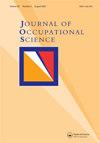Occupational transitions of leaving a cult: A study of publicly available accounts
IF 2.9
Q1 SOCIAL SCIENCES, INTERDISCIPLINARY
引用次数: 0
Abstract
ABSTRACTWhile the formation of cults worldwide has steadily decreased since the 1970s, there are still a significant number of former members who have been impacted by their involvement and face unique challenges transitioning out of these organizations. While research within the field of psychology is robust, little is known about the occupational transition of individuals who leave cults. This study utilized a qualitative interpretive description methodology. Data consisted of 11 first-hand accounts of former members across various multimedia sources (memoirs, podcasts, blogs, and social media posts). The frameworks of doing, being, becoming, and belonging were utilized to guide theme development and enrich the analysis. Data were analyzed using reflexive thematic analysis and five themes were identified: Forbidden occupations, Fish out of water, Finding closure through occupation, (Re)Discovering self through occupation, and Rebuilding life. This study contributes to occupational science research by examining the occupational transition of leaving a cult. Increasing the knowledge base on this topic will not only increase understanding of this population but generates an opportunity to provide occupation-centered supports to enhance transitions. Additional research that embraces former members’ active participation across the research process and methods that allow for more feedback from former members, including interview-based methods, may further validate the findings of this study and amplify the experience of this population in transition.RESUMEAlors que la formation de sectes dans le monde entier a régulièrement diminué depuis les années 1970, il reste un nombre important d'anciens membres qui ont été marqués par leur participation et qui sont confrontés à des défis uniques lorsqu'ils quittent ces organisations. Bien que la recherche dans le domaine de la psychologie soit solide, on sait peu de choses sur la transition occupationnelle des personnes qui quittent les sectes. Cette étude repose sur un devis qualitatif descriptif et interprétatif. Les données consistaient en 11 récits à la première personne d'ancien·nes membres à travers diverses sources multimédias (mémoires, podcasts, blogues et messages sur les médias sociaux). Le modèle de l'action, de l'être, du devenir et de l'appartenance a été utilisé pour guider le développement des thèmes et enrichir l'analyse. Les données ont fait l'objet d'une analyse thématique réflexive. Cinq thèmes ont été identifiés : les occupations interdites, un poisson hors de l'eau, tourner la page grâce à l'occupation, se (re)découvrir à travers l'occupation, et reconstruire la vie. Cette étude contribue à la recherche en science de l'occupation en examinant la transition occupationnelle liée à la sortie d'une secte. L'approfondissement des connaissances sur ce sujet permettra non seulement de mieux comprendre cette population, mais aussi de générer des mesures de soutien axées sur l'occupation pour faciliter les transitions. Des recherches participatives, où seraient impliqué·es tout au long du processus d'ancien·nes membres d'une secte ainsi que des collectes de données reposant sur des entretiens, permettraient de valider les résultats de cette étude et reconnaitre l'expérience de cette population en phase de transition.KEYWORDS: Occupational science; doingbeingbecomingbelongingoccupational transitionBounded Choice TheorycultMOTS-CLÉS: Science de l'occupationfaire, être, devenir, appartenirtransition occupationnellethéorie du choix limitésecte AcknowledgmentsThank you to the former members who bravely shared their experiences with the world. We also express our gratitude to Dr. Adele Breen-Franklin for her support of this research topic and constructive comments on the manuscript.Disclosure StatementNo potential conflict of interest was reported by the author(s).离开邪教的职业转变:一项公开资料的研究
摘要自20世纪70年代以来,世界范围内邪教的形成已经稳步减少,但仍有相当数量的前成员受到邪教的影响,并面临着从这些组织中过渡出来的独特挑战。虽然心理学领域的研究很活跃,但人们对离开邪教的人的职业转变知之甚少。本研究采用定性解释描述方法。数据包括11个来自各种多媒体来源(回忆录、播客、博客和社交媒体帖子)的前成员的第一手资料。运用“做”、“存在”、“成为”、“归属”等框架指导主题发展,丰富分析内容。采用反身性主题分析方法对数据进行分析,确定了五个主题:禁忌职业、出水之鱼、通过职业寻找封闭、通过职业(再)发现自我和重建生活。本研究通过考察离开邪教的职业转变,有助于职业科学研究。增加这一主题的知识库不仅可以增加对这一人群的了解,而且可以提供以职业为中心的支持,以加强过渡。进一步的研究,包括前成员在整个研究过程中的积极参与,以及允许前成员提供更多反馈的方法,包括基于访谈的方法,可能会进一步验证本研究的结果,并扩大转型期人口的经验。在1970年的一次会议上,我们将讨论一些重要的会议成员,例如,我们将讨论一些重要的会议成员,例如,我们将讨论一些重要的会议成员,例如,我们将讨论一些重要的会议成员,例如,我们将讨论一些重要的会议成员,例如,我们将讨论一些重要的会议成员,例如,我们将讨论一些重要的会议成员,例如,我们将讨论一些特殊的会议成员,例如,我们将讨论一些特殊的会议成员。我们的心理学研究领域是坚实的,我们的研究领域是稳定的,我们的研究领域是稳定的,我们的研究领域是稳定的,我们的研究领域是稳定的。不同的变质质取决于不同的变质质描述。11个组织的成员通过多种来源(组织、播客、博客和信息)传播不同的信息(组织、组织和组织)。“行动模式”、“行动模式”、“行动模式”、“行动模式”、“行动模式”、“行动模式”、“行动模式”、“行动模式”、“行动模式”、“行动模式”、“行动模式”、“行动模式”、“行动模式”、“行动模式”、“行动模式”、“行动模式”、“行动模式”、“工具模式”、“分析模式”。我的目标是,我不需要分析,我的目标是,我要分析,我的目标是,我要分析,我的目标是,我要分析,我的目标是,我要分析,我的目标是,我要分析。5 . 职业信息交换系统- - -确定职业信息交换系统- - - 职业信息交换系统- - - 职业信息交换系统- - -重建生活。在职业科学的研究中,对职业过渡时期的研究,对职业过渡时期的研究,对职业过渡时期的研究,对职业过渡时期的研究,对职业过渡时期的研究,对职业过渡时期的研究,对职业过渡时期的研究。为促进人口的过渡,应采取措施确保人口的稳定,并采取措施确保职业的稳定,以促进过渡。研究参与者,où高级影响者,研究人员,研究人员,研究人员,研究人员,研究人员,研究人员,研究人员,研究人员,研究人员,研究人员,研究人员,研究人员,研究人员,研究人员,研究人员,研究人员,研究人员,研究人员,研究人员,研究人员,研究人员,研究人员,研究人员,研究人员,研究人员,研究人员,研究人员,研究人员,研究人员,研究人员,研究人员,研究人员,研究人员,研究人员,研究人员,研究人员,研究人员,研究人员,研究人员,研究人员,研究人员,研究人员,研究人员,研究人员,研究人员,研究人员,研究人员,研究人员,研究人员,研究人员,研究人员,研究人员,研究人员,在过渡阶段,研究人员,研究人员。关键词:职业科学;doingbeingbecomingbelongingoccupational transitionBounded选择TheorycultMOTS-CLES:科学de l 'occupationfaire可能,devenir, appartenirtransition occupationnelletheorie du选择limitesecte AcknowledgmentsThank你前成员勇敢地与世界分享他们的经验。我们也感谢Adele Breen-Franklin博士对本研究课题的支持和对稿件的建设性意见。披露声明作者未报告潜在的利益冲突。
本文章由计算机程序翻译,如有差异,请以英文原文为准。
求助全文
约1分钟内获得全文
求助全文
来源期刊

Journal of Occupational Science
SOCIAL SCIENCES, INTERDISCIPLINARY-
CiteScore
4.30
自引率
41.70%
发文量
46
 求助内容:
求助内容: 应助结果提醒方式:
应助结果提醒方式:


